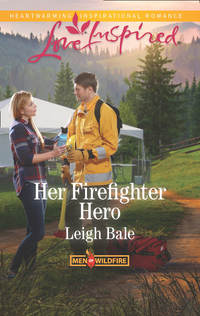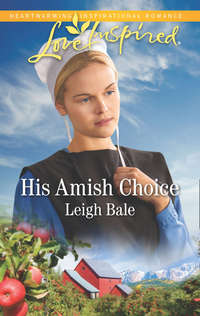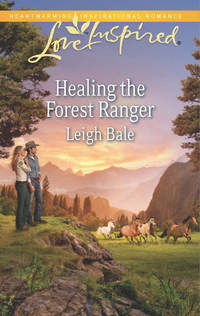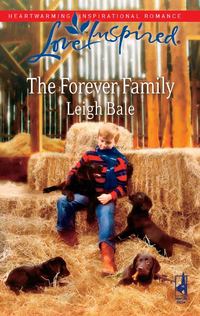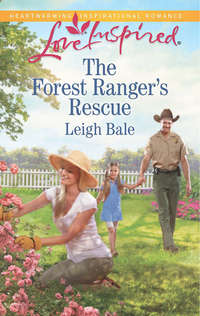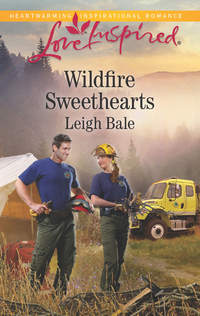
Полная версия
Falling for the Forest Ranger
As the Fisheries and Wildlife staff officer, Tanner had been assigned the task of giving this woman a tour of Bingham River and its tributaries. Which would take all summer long. He had to cooperate with her in any way he could.
What rotten luck.
“Why don’t we get started?” Tanner glanced at Ron, trying not to sound irritable. The fact that Ron gave him a worried look told Tanner that he’d failed in that endeavor.
“Right.” Ron grabbed the overhead clicker. With a punch of his finger, he brought up the first slide to the PowerPoint presentation he’d been asked to prepare. A brief overview of the Steelhead National Forest and the fishery problems they were dealing with.
“Will you get the lights, Chuck?” Tanner called over his shoulder.
A click sounded and the room went dim. Tanner focused on the screen at the front of the table, glad to have an excuse to take his eyes off Zoë.
The first slide showed a brilliant picture of Bingham River, the rushing waters bordered by willows, sedges and Kentucky bluegrass.
With each slide, Ron narrated in an overly loud voice. “The elevations of Bingham River range from nine hundred to over five thousand feet. The river and its tributaries are home to numerous animal species, but our focus today will be on the steelhead, bull trout and Chinook salmon. All these fish are on the endangered-species list.”
“Don’t you have a serious problem with the sockeye, too?” Zoë asked.
Ron’s expression wilted along with his confidence. “Um, yes, and sockeye, too. But the only population of sockeye is located at Redfish Lake in the upper Salmon River basin.”
“Yes, I’d heard that. But I’m hoping we can work on introducing them to the Bingham River arena.”
Tanner interceded, trying not to sound defensive. “We’re already working on that. In fact, Ron’s done some great work with the Sawtooth Hatchery to help establish the sockeye in Bingham River by using Clear Lake at its head.”
Ron showed a broad smile of gratitude for the praise.
“I see. And how many hatcheries do you have?” Zoë asked.
“There are twenty-one salmon and steelhead hatcheries owned or operated by the Service.”
The Service was short for the U.S. Fish and Wildlife Service.
“Okay, good. Thank you.” Zoë turned her serene gaze back to the screen, not seeming ruffled in the least. In fact, she seemed genuinely interested in what they were saying.
And that’s when Tanner had an inkling that she wasn’t here as some sort of practical joke. She was just doing her job. He’d seen her résumé, which indicated an educated, qualified professional. Maybe he should reserve judgment until he saw what she was capable of.
A picture of Grand Coulee Dam flashed across the screen. A monolith of concrete and steel, the dam stood 550 feet tall. “Large hydroelectric dams and floodgates along the Columbia River have completely blocked the water, so fish can’t swim upstream to spawn.”
The biologist brought up another slide of the now-abandoned Moses Mine, located ninety miles outside of town. “Tailings from copper mines have poisoned the creeks. It’s taken thousands of dollars and decades of work to clean up the mess, and we still don’t have it cleaned up. Every time we have another flooding rain, it just brings the poisons back into the creekbeds.”
Ron pressed the button again. Another slide of dozens of salmon lying dead across a local farmer’s potato field appeared. “Water diversion for irrigation causes numerous problems. Without screens, fish get lost and bypass the canal, ending up in irrigation ditches with nowhere to go. Irrigation usage lowers the water level in creeks, so fish can’t swim upstream. With less water, the temperature increases to critical levels. Pollutants become more concentrated. All these things kill off fish fry and smolt by the thousands.”
Zoë shook her head, her lips pursed in disgust.
A slide showing a barren mountain once populated by tall ponderosa pine flickered overhead and Ron continued his dialogue. “Many logging operations have been allowed to overharvest trees in some areas, causing massive erosion into the streams.”
Ron’s last slide showed several red Angus cows standing in the middle of a stream while their owner sat on his horse on the edge of the bank and looked on. “Ranchers allow their cattle to roam freely along the creekbeds, denuding vegetation from the stream banks as well as stomping on the fragile redds.”
Ron clicked off the presentation. “That’s it.”
Tanner nodded at Chuck to turn the lights back on. “And, of course, wildfire also creates an environment for erosion, though we’ve been taking precautions to help alleviate the possibility of wildfires.”
Zoë’s chair creaked as she sat back. “But the environment seems to recover more quickly from wildfire erosion than it does from timber-harvest erosion.”
“That’s correct, Ms. Lawton,” Tanner agreed, surprised that she knew this. “Nothing’s changed from what you already know. We’ve got a lot of problems to deal with.”
“What would you say is the biggest problem the endangered fish are facing?”
Tanner didn’t hesitate to respond. “That’s easy. The hydroelectric dams. They’re impregnable for fish to pass through.”
Her eyes crinkled as she thought this over. “Unfortunately we can’t do anything about that.”
“You’re right, Ms. Lawton. Saving our endangered fish has proven to be a challenge we’re determined to meet.”
She smiled politely, speaking in a soft, confident tone. “I don’t see why the solutions are complicated. We just tell the farmers, ranchers and loggers what they can and can’t do. Then we enforce it, giving the streams and fish time to recover from the abuse. And please, call me Zoë.”
Not if he could help it. Instead, he cleared his throat. “The farmers and ranchers only care about their livelihoods, not a bunch of fish that have landed on the endangered-species list.”
“That’s true,” Chuck said. “Two years ago, we had four hundred angry farmers and loggers picketing our building like a pack of sharks. They were furious with the changes we were trying to make because it jeopardized their incomes. Now Tanner and his team have them at least listening to our ideas. But progress has been slow.”
Zoë crossed her long legs. Her lovely eyes narrowed, her soft mouth hardening with determination. “We can’t afford to make slow progress. Something must be done now. I have instructions to put a stop to the abuses and improve the situation along Bingham River. My boss in Portland expects nothing less. And that’s what I intend to do.”
“We’re interested in the same thing,” Tanner assured her, feeling protective of his efforts with the farmers and loggers. Over the past three years, he’d made a lot of progress in helping the endangered fish. They didn’t need this woman’s interference. The last thing he wanted was for an outsider to come in and mess up all his hard work.
“That’s right,” Chuck agreed. “And I think you’ll find that Tanner is the one man who has the acumen to deal with all our water users. He has a special touch for getting the ranchers and loggers to cooperate with us in helping improve the spawning runs.”
Chuck tossed Tanner a smile full of confidence, but in his eyes, Tanner detected a glint of warning. As the forest supervisor, Chuck didn’t want to upset the marine biologist from the National Marine Fisheries Service. Tanner reminded himself they were all working for the good of the endangered fish, but he was also smart enough to know that politics weighed heavily in this equation. Any failure on Tanner’s part would trickle downhill. It could make Chuck look bad, which would bounce down onto Tanner’s head.
So Tanner must not fail. Even if it meant working with an attractive marine biologist like Zoë Lawton.
“We obviously want the same things. So where do we start?” Zoë asked.
Tanner unrolled a large map and pointed out particularly troublesome areas along the river. The group discussed each issue at length.
“When can we go out to look at some of these sites?” Zoë asked.
Tanner couldn’t help being pleasantly surprised. At least she seemed eager and willing. “I’ve already set up some interviews with a few farmers on Saturday morning.”
She hesitated, her forehead creasing with a frown. “Does it have to be on Saturday?”
“That’s the best time for the farmers. When we accommodate their schedules, they’re more friendly and willing to hear us out.” Tanner hoped she wouldn’t demand the farmers meet her timetable.
“I can go, but my son will need to tag along. I don’t have child care on Saturdays. Is that okay?”
Oh, no. Not the kid. A sinking feeling of dread settled in Tanner’s stomach. The last thing he wanted was to spend his weekend with this lovely woman and her talkative little boy.
“That’ll be fine,” Chuck said.
With his boss sanctioning it, Tanner had little choice but to agree. “We’ll leave from here. Meet me in the parking lot at eight a.m. and plan to be gone most of the day.”
“Will do.” Zoë scooted back her chair and stood gracefully before turning to shake first Gary’s, then Ron’s hand. When she reached toward Tanner, she met his gaze without flinching. “Thank you for this enlightening discussion. I look forward to working with you.”
Tanner pasted a smile on his face, but inside he was screaming. Why did she have to be so friendly and stunning?
As he left the conference room and sauntered down the hall to his office, he couldn’t help feeling sabotaged by his boss. Over the next few months, there were a myriad of creeks and streams along the river that he and Zoë would have to traverse. But Tanner didn’t have to like it. He could be civil but remote and professional. Above all else, he must protect his work.
Chapter Three
“Jonah, we’re late!” Zoë kept her voice calm as she stood at the front door holding her son’s jacket.
Though morning sunlight streamed through their living room window, the boy yawned and stumbled down the hallway as if it were the middle of the night. Wearing a pair of blue jeans, a sweatshirt and tennis shoes, he rubbed his sleepy eyes. Zoë handed him his jacket, then bent down to tie his dangling shoelaces. The boy’s blond hair still stuck up in back, despite her best efforts with the spray bottle and comb to flatten it down.
“Why do we have to go so early?” He slipped his little arms into the sleeves of the jacket.
Zoë stood and zipped it up. “I told you already. I have to work, but I thought we could make it a fun outing.”
Not much fun getting up early on a Saturday morning.
“But I wanna watch cartoons.”
“We may see some fish and I made us a picnic lunch.” She lifted her brows, trying to coax a smile out of him.
He didn’t disappoint her. His startling blue eyes widened. “Great! Are we going fishing, too?”
She shook her head. “Not today, but soon.”
To make their day a bit more fun for Jonah, she’d tucked a canister of homemade chocolate-chip cookies into their lunchbox for dessert.
“Where we going?” His fingers tightened around hers as they walked out to the car.
“I’m not sure. You remember the man whose truck you hit with the shopping cart?”
“Yeah. He didn’t like us much.” He gave her a dubious frown.
“His name is Tanner Bohlman and it turns out he’s the man I’ll be working with this summer.”
“Uh-oh.” Jonah’s eyes widened with worry.
“Don’t fret about scratching his truck anymore. It’s been dealt with,” she insisted.
He gave her a trusting smile and she couldn’t resist kissing his forehead.
She opened the car door and he hopped inside before she helped him with his seat belt. She then pressed a bacon, egg and cheese sandwich into his hand for him to eat along the way.
Jonah bit into the sandwich and chewed vigorously. “He’s with the Forest Service?”
“Yes, and he wants to take us out today to show us some of the irrigation ditches where salmon are getting lost.”
She closed his door, then rounded the car and climbed into the driver’s seat. As she clicked on her own seat belt, she glanced at Jonah and noticed a crumb of bread clinging to his chin. She gestured toward it and he wiped his mouth. She started the engine and put the car into gear.
“What if he’s still sore with me about what happened?” Jonah said.
As they backed out of the driveway and pulled into traffic, Zoë lowered her sun visor and tried to reassure her son. “Don’t worry, I think he’s gotten over that.”
Or had he? Jonah was right. The man didn’t seem to like them very much, and she hoped he wouldn’t hold a grudge. No matter what, she had a job to do and didn’t want anything to get in the way of her work.
When they pulled into the parking lot of the supervisor’s office thirteen minutes later, Tanner stood outside, wearing the spruce-green pants and drab olive-green shirt of a forest ranger. His bronze shield gleamed in the morning sunshine. Since it was Saturday, she was surprised to see him wearing his uniform. She’d expected casual attire like she was wearing. But then she thought better of it. They were on official business today and Tanner looked the part.
Leaning against his truck, he folded his arms and crossed his ankles. A deep frown marred his high forehead. If not for his gruff manners, he’d be a strikingly handsome man. And she couldn’t help wondering what had made him so grouchy.
Barring the door on that thought, Zoë parked her car next to his truck and killed the motor.
Jonah peered out the window as he unbuckled his seat belt. “He don’t look too happy, Mom.”
“Doesn’t look happy.” She corrected his grammar. “And his mood might have something to do with the fact that we’re almost ten minutes late.”
“Sorry, Mom.”
She got out and opened the back door, leaning over to press a kiss against Jonah’s warm cheek before gazing lovingly into his eyes. “Don’t worry about it, sweetheart. We’re not in a hurry today. Let’s just have fun, okay?”
“Work can be fun?” he asked.
“Absolutely. I have fun working all the time.” Which was true. She loved her job. Except for Jonah and the Lord, it was the most important thing in her life.
“Then let’s go to work.” Jonah returned her smile.
As she drew away, he zipped out of the car so fast she didn’t have time to stop him. “Jonah, wait.”
Too late. He was gone.
With a deep sigh, she reached for the picnic basket and another bag of towels and dry clothes she’d brought just in case she got wet taking water samples. She locked the car and followed as fast as she could.
Like a stealth bomber, Jonah headed straight toward Tanner. Zoë hurried to follow, unsure of Tanner’s mood.
The man unfolded his arms and stepped away from his truck. As Jonah approached, Tanner held his hands up as if to protect himself. A flash of uncertainty filled his eyes, then was gone so fast that Zoë thought she must have imagined it. Maybe Tanner wasn’t used to being around little kids. Surely he wasn’t afraid of Jonah.
“Hi, Tanner!” Jonah called.
“Mr. Bohlman.” Zoë corrected her son’s rudeness.
“He can call me Tanner.” Tanner’s voice sounded low and nervous as his gaze flickered over to Zoë.
“I’m sorry we’re late. My little sleepyhead couldn’t seem to get up this morning. But I told him you wouldn’t mind.” She ruffled her son’s hair and smiled fondly, hoping her declaration would ease Tanner’s tension just a bit.
It didn’t work. If anything, his shoulders stiffened more.
Jonah jutted his chin toward the ugly scratches still marring the side of Tanner’s truck. “You’re not mad at me anymore, are you?”
Oh, the innocent sincerity of a young child.
“No. Forget about it,” Tanner said.
Zoë gazed at the man, trying to see the truth in his eyes. His blank expression gave her no clues. She hated playing games and decided to take Tanner at his word. If he said he wasn’t bothered by the scratches, then she shouldn’t be, either. But she sure wished he’d let her pay for the repairs.
“Shall we go?” she asked.
“Yeah, let me help you with that.”
He reached to take the picnic basket and bag from her. His fingertips felt warm and roughened by calluses as they brushed against her hand. He jerked back, as though he’d been burned. She couldn’t read his expression as he turned and opened the door of his truck so she and Jonah could climb inside.
“We’re not taking a Forest Service vehicle?” she asked as she settled into her seat.
He shook his head, staring at the basket with pensive eyes. “No, it wouldn’t look good with Jonah along. Someone might complain that we’re using a federal vehicle for personal use.”
Her mouth dropped open. “Why would they do that?”
He shrugged his broad shoulders. “Beats me. One of my friends almost got fired over such a trivial thing.”
“Because he had one of his children in a government vehicle?”
“Yep. People don’t stop to realize the long hours a forest ranger works. Sometimes they take their family with them up into the mountains just so they can spend some time together. Since we’ll have Jonah with us today, I figure it’s best to take my own vehicle. Better safe than sorry.”
She never knew. But then, she figured she had a lot to learn on this new assignment. She’d lived in large cities all her life, spending the majority of her time in a lab. She’d never worked out in the field with farmers, ranchers, or logging and mining operations. As long as she helped resolve some of the fishery problems, the inconvenience of moving to this tiny town would be worth it.
“What’s this?” He gestured to the basket.
“Our lunch. Since we’ll be gone most of the day, I thought we might get hungry.”
He frowned. “I didn’t think about that.”
She laughed, trying to lighten him up with a bit of humor. “You must not have any kids.”
“Nope.” His jaw hardened as he stashed the basket in the backseat.
Oh, dear. This wasn’t working out the way she’d hoped. Was he like this with everyone he met or just her?
She glanced at his ring finger and found it bare. Not even a hint of a shadow. That didn’t mean he wasn’t in a relationship, but he didn’t have the manners of a married man. Maybe he just liked to keep to himself. Or maybe, from the way he kept tossing covert, grumpy looks in her direction, he just didn’t like her. She didn’t know why that would be, but maybe keeping things between them professional would be best. She didn’t want a romantic entanglement right now. She had her hands full with her job and raising her son.
She jerked her thumb toward Jonah. “With this kid always asking for food, I learned to always have snacks on hand. Don’t worry. We have plenty for you, too.”
He hesitated, a look of open amazement on his face. As if he couldn’t believe she’d provide for him, too. Then he rounded the truck and got into the driver’s seat before addressing her comment. “You don’t need to feed me.”
She gave a soft laugh, wishing he wasn’t so handsome. “Don’t worry. We’re happy to share.”
“Wait till you taste Mom’s cookies.” Jonah leaned close to Tanner’s side and shielded his mouth with one hand as he whispered loudly, “But she thinks I don’t know about them, so act surprised when she gets them out, okay?”
Tanner laughed, a spontaneous sound that rumbled deep in his chest. “I think the cat’s out of the bag now.”
He indicated Zoë with his chin. Jonah glanced at his mother and realized that she’d overheard every word.
“Ah!” the boy groaned and covered his face with his hands.
She gave him a scolding look. “I take it you did a little peeking this morning while I was getting dressed.”
“Just a little,” Jonah said.
And yet, she hadn’t been able to get him out of bed. She shook her head, never understanding the workings of a child’s mind.
Tanner chuckled and Zoë couldn’t deny that she found the sound delightful. Finally. Finally they’d broken through his harsh exterior.
“You should do that more often,” she said.
“What?” Tanner inserted the key into the ignition and started the engine.
“Laugh.”
He flushed a deep red color, looking mortified. Which made her laugh, in turn.
“Don’t worry, I won’t tell anyone,” she said. “We wouldn’t want to ruin your fierce reputation.”
As if trying to ignore her comments, Tanner glanced at Jonah. “How old are you?”
“Six. I play T-ball. I can hit the ball clearrrr across the field.” He opened his little arms wide to make his point. “Next fall, I’ll be in second grade. Do you like to fish?”
Tanner blinked, as though trying to keep up with the changes in conversation. “Yeah, I like to fish.”
“Can we go fishing today?”
Tanner put the truck into gear and pulled out of the parking lot. Over the top of the boy’s head, he met Zoë’s gaze. “I’m afraid not. We’re going to meet with some farmers today. Do you like to fish?”
Jonah shrugged, gazing over the dashboard and out the windshield. “Don’t know. Remember? I already told you I never been before. But I’d sure like to go sometime.”
Tanner looked straight ahead as they approached the intersection.
Jonah kept talking. “My dad used to go fishing when he was a kid. Mom told me so. Even though he died, Mom says he loved me like crazy.”
Oh, that hurt. Zoë had never heard Jonah speak so freely about his father. It still left her breathless with pain every time she thought about Derek’s death in a skiing accident only eleven months after Jonah’s birth. Without warning, all their hopes and dreams had been dashed to pieces. And poor Jonah, left without a father. He didn’t even remember his daddy, outside of the things she had told him.
Life could be so unfair.
“Is that so?” Tanner’s gaze slid over Zoë, as if seeking the truth in her eyes.
“Yeah, but me and Mom get along just fine. Someday, I suppose she’ll get married again. But not without my approval. She told me so.” Jonah sat between them, smiling with anticipation.
“My dad died when I was eight and my mom when I was ten,” Tanner said.
Zoë hadn’t expected him to confide something so personal. Not to them. Her heart went out to him. Being orphaned so young couldn’t have been easy.
“Really? You lost both your parents?” Jonah peered at Tanner, his mouth hanging open in astonishment.
“Yep, so I didn’t have anyone to take me fishing, either.”
Zoë absorbed every word like dry sand soaking up rain. How she wished Jonah could have known his daddy. Knowing that Tanner had faced the same loss left her feeling melancholy.
“Then who taught you to fish?” Jonah asked.
“At first, my grandpa taught me,” Tanner said. “We’d go fishing and then come home and eat my grandma’s homemade apple pie. It’s one of my fondest childhood memories. But he died when I was thirteen. Grandma died a year later.”
“Who raised you after your grandparents died?” Zoë asked.
“Foster care.” His jaw hardened, as though he’d rather not talk about it.
She didn’t blame him.
Jonah heaved a little sigh. “I wish I had a grandpa, but me and Mom are all alone, just like you. Except for God. Mom says we’re never really alone, as long as we have the Lord with us.”
How profound. In that moment, Zoë realized that all their discussions, all the bedtime prayers and taking her son to Sunday school classes, had actually paid off. In spite of his wiggling and talking during lessons, part of what Jonah had been taught had actually sunk in.
Tanner frowned and turned away, making a pretense of adjusting his rearview mirror. “Some people just use God as a crutch.”
“What do you mean by that?” Zoë couldn’t help asking.
“Never mind. It’s not really an appropriate business topic anyway.”
Zoë hesitated to push. It wasn’t her business, after all. She worked in a scientific field and had met her share of religious skeptics before, but something in Tanner’s eyes told her he’d believed in God once but had somehow lost his faith. “It’s Saturday, we’re not in the office, we’re in your personal truck, so go ahead and talk. I don’t mind. Don’t you believe in God?”


